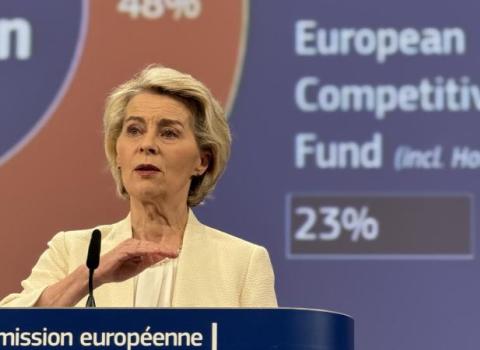Research lobbies upbeat following adoption of report on future Framework Programme by Parliament’s research committee

European Parliament's building in Brussels. Photo credits: Alain Rolland / European Union
Research lobbies have reacted enthusiastically to a report by members of the European Parliament that endorses the creation of a standalone FP10, the next EU research and innovation Framework Programme, and calls for dramatic budget increases.
As expected, the Parliament’s Committee on Industry, Research and Energy wants to see the programme given a €220 billion budget, with increased allocations to both the European Research Council (ERC) and the European Innovation Council (EIC).
The own initiative report was approved by the committee on February 19, by 67 votes to five, with nine abstentions. It will now go to a plenary session of the Parliament in March.
Since September, speculation has been growing that instead of a standalone programme to succeed Horizon Europe in 2028, research and innovation funding would be absorbed into a broader competitiveness fund. The absence of FP10 from the Commission’s recently published Competitiveness Compass strategy has only fuelled such fears.
The MEPs’ report is seen as a valuable push back, even if its conclusions will not be binding on the European Commission or the Council.
“Given the current uncertainty around FP10, this report is an important signal of the European Parliament’s commitment to sustained investment in research and innovation,” said Ramon Puras, secretary general of AURORA universities, told Science|Business.
“We are hopeful that the European Council will adopt a similar approach in the upcoming discussions among research ministers in March,” said Kamila Kozirog, policy analyst at the European University Association. “With these two institutions [Parliament and Council] clearly showing the need to preserve FP10 as a standalone programme, we hope the Commission will reconsider its current approach.”
According to Olga Wessels, head of the Brussels office at the European Consortium of Innovative Universities, while the formal existence of FP10 is unlikely to be in question, given its basis in the Treaties, concerns remain over its structure, its funding levels and, most importantly, its independence from a broader competitiveness fund.
But for Kurt Deketelaere, secretary general of the League of European Research Universities, it is clear that the research and innovation community is heading for a “hard and long battle” against the European Commission.
MEPs’ wish list
In addition to calling for more money, the MEPs backed the creation of two independent councils in FP10, an Industrial Competitiveness and Technology Council and a Societal Challenges Council. This would place the majority of the Framework Programme’s management in the hands of independent experts rather than the Commission. This proposal builds on a concept outlined in a high-profile report on FP10’s future, led by former Portuguese science minister Manuel Heitor.
Additionally, the report calls for a less bureaucratic Framework Programme by cutting red tape and adopting a “trust first, check later” approach in calls.
A contentious amendment calling for the European Institute of Innovation and Technology (EIT) to be reformed and refocused remained in the final text, addressing concerns over financial sustainability requirements for the EIT’s communities and the EIT’s overly bureaucratic central management, which “many stakeholders” find more costly than beneficial.
One proposal that did not make it into the final draft was a push to allocate half of the FP10 budget to the ERC and EIC, a move strongly opposed by some MEPs, who argued it would lead to cuts in pre-competitive research and innovation projects.
Likewise, an initial proposal to eliminate most of the Missions and reduce lump sum funding were softened in the final version of the report.
According to Wessels, the report is notably lacking in references to citizen science, public engagement and living labs, all areas that could help bridge the growing gap between science and society. At a time of declining public trust in science, she emphasised that greater citizen involvement could also enhance the commercialisation of research.
“If your research project directly involves end users and businesses, it will be much easier to scale up your research output after the project ends,” she said.
Preparing the budget
Elsewhere in the European Parliament, the Budget Committee presented a draft report outlining the Parliament's vision for the post-2027 Multiannual Financial Framework (MFF).
Prepared by Siegfried Mureşan and Carla Tavares, the draft calls for additional investment in competitiveness, research, innovation, small and medium-sized enterprises, health, energy, security, defence, critical technologies, and the digital and green transitions.
The document also emphasises the need for a simpler, more transparent MFF that is flexible and responsive to crises and shocks.
“This Parliament will not be in a position to give its support to a budget that foresees a big role for the Commission and for the Council, a weak role for the Parliament, and no role for the regions,” Mureşan stated. “For us to be able to give a green light to the budget, we expect the Parliament to be involved from the beginning to the end of the process in the negotiations, in the adoption and in the implementation phase of this Multiannual Financial Framework.”
A committee vote on the report is scheduled for April 23-24. The plenary vote is expected in the first week of May, and the Commission is expected to present its MFF proposal in July.





 A unique international forum for public research organisations and companies to connect their external engagement with strategic interests around their R&D system.
A unique international forum for public research organisations and companies to connect their external engagement with strategic interests around their R&D system.